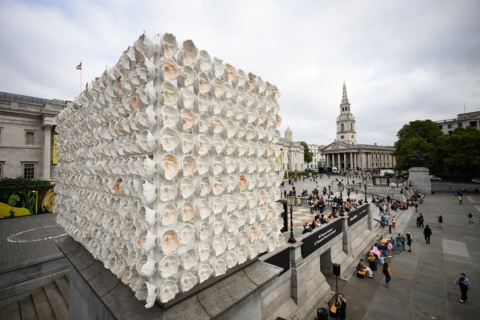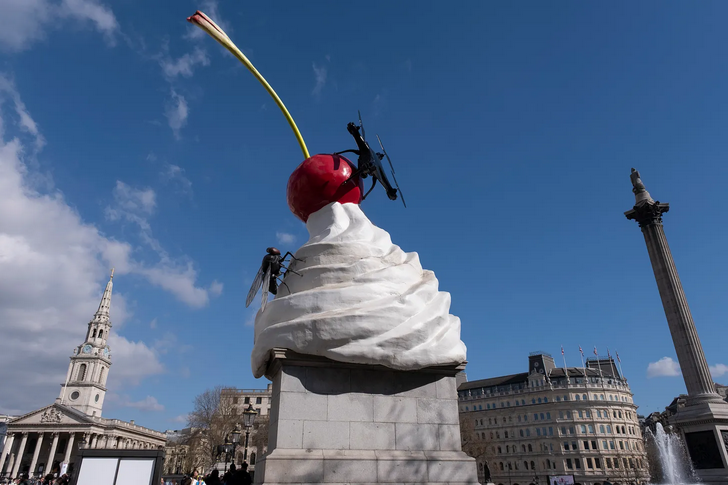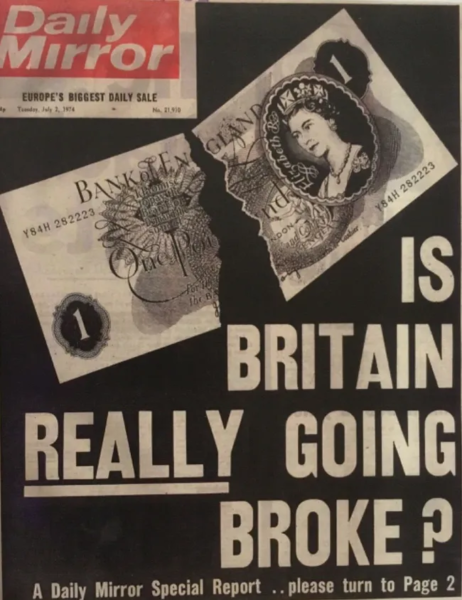Now, obviously, there are reasons why building infrastructure is expensive. One is that politicians have taken unto themselves the power to decide what infrastructure should be built how and where. Therefore infrastructure is built by fuckwits, obvious, innit? We’ve also allowed far too many people to dip their ladle in the gravy — that £300 million planning inquiry into a tunnel under the Thames. And did I say fuckwits already — that £100 million bat tunnel.
But one reason all these things are so expensive is because we’re not doing them on terra nullius. If we start with a bare field a ground source heat pump might well not be that bad an idea. Communal heating systems into an entirely new development, maybe.
But putting ground heat pumps into central London? Can’t do that ‘ere mate, someone’s already built central London right where you want to dig up. HS2 goes right through some of the most expensive — and inhabited by the highly vocal — countryside in the nation. Edinburgh, minor though it is, still has that central London problem.
This also explains why Mercury Comms employed the ferrets. The tubes already existed and fibreoptic could be stuffed down them. They didn’t have to dig up central London, see?
Agreed, this isn’t one of the world’s truly great insights but it is something to keep in mind. The reason building the infrastructure for the next level of civilisation costs so much is because we already have a civilisation. The existence of which gets in the way of the building men …
Tim Worstall, “Why Is Infrastructure So Damn F’n Expensive?”, It’s all obvious or trivial except …, 2024-11-18.
February 21, 2025
QotD: Why does it cost so much to build modern infrastructure?
February 11, 2025
Mapping the Tube 1863-2023: Treasures of the Tube Map
Jago Hazzard
Published 27 Oct 2024Mapping the Tube: 1863-2023 at The Map House is a captivating selling exhibition showcasing rare maps and materials spanning over 160 years of London’s transport history. It features the largest collection of Harry Beck manuscripts ever offered for sale, alongside early cartographic works and striking posters by 20th-century artists.
(more…)
January 31, 2025
I Spent Over 12 Hours on an Amtrak Train (on purpose)
Not Just Bikes
Published 6 Oct 2024Chapters
0:00 Intro
1:24 Leaving New York
3:04 On the train
4:03 The views
4:38 Freight trains & delays
5:37 The train is so much more comfortable
7:09 The border crossing
8:17 The Canadian side
9:24 Should you take this train?
10:20 Comparisons to Europe & Japan
11:20 We need more high-speed rail
12:02 VIA Rail is bad … and getting worse
12:58 VIA Rail is expensive!
14:11 The new VIA Rail baggage policy
15:49 Better train service is important!
17:14 Concluding thoughts
(more…)
January 13, 2025
January 2, 2025
Why Germany Lost the Battle of Britain
Real Time History
Published 2 Aug 2024Summer 1940. The United Kingdom is gripped by the fear of a German invasion. Even if the Luftwaffe secures the sky over Britain, could Germany’s Operation Sea Lion ever really work?
(more…)
November 14, 2024
QotD: The tragedy of the commons in North London
Despite this being North London we’re not talking about common people here and the tragedy of their entering the precincts of the progressives. Rather, the tragedy of common resources.
One fact about those bathing ponds on the Heath:
Honesty boxes for bathers to pay to swim were introduced in 2005. There were plans for a compulsory charge in 2012, but they came to nothing.
We have open access to a resource, Marxian access. We also have one other fact:
It was once a well-kept secret. Now the bathing ponds on Hampstead Heath are among the most crowded parts of London on a hot summer’s day.
We have – by one measure at least – excessive use of that resource, use that needs to be limited in some manner.
This is a problem that has been noted before, it’s called the Tragedy of the Commons. As Garrett Hardin points out there are only two ways of restricting such access, capitalist – charge for it – or socialist – regulate.
The third option, Elinor Ostrom’s, does not work with this number of people. That communal agreement tops out at about 3,000 peeps, not 10 million.
Which of the two solutions works depends upon the specific circumstance and isn’t the point to be made here. Rather, the lesson to learn is that Marxian access just doesn’t work when demand is at or above capacity. A useful thing to think about when contemplating other areas of the economy.
Tim Worstall, “Hampstead Heath Ponds And The Tragedy Of The Commons”, Continental Telegraph, 2020-01-19.
October 16, 2024
Many of the posh pro-trans activists are objectively anti-gay
It’s starting to be a true wedge issue in the LGBT community, as the logic of the pro-trans activists leads quite directly to the suppression of the gay and lesbian parts of that community:
It was hardly a plague of locusts, but it was disruptive nonetheless. During the annual LGB Alliance conference at the Queen Elizabeth II centre in Westminster on Friday afternoon, teenage activists unleashed thousands of crickets into the auditorium. The inconvenience was only temporary. The crowd simply relocated to another room and the event went on as before.
As those responsible were apprehended, many people were struck by just how young and posh they were. By this point, it should surprise precisely no-one that anti-gay activism in its current form is a predominately bourgeois pursuit. The symbolism of the crickets was, of course, deliberate. It was an attempt to dehumanise those in attendance, to suggest that they were akin to parasites, vermin, spreaders of disease, a common trope of those who seek to demonise minorities.
The perpetrators were children, and so it would be unwise to speculate too much on their motives. It is likely they were being manipulated by the group that has claimed responsibility, calling itself “Trans Kids Deserve Better”. As Bev Jackson, co-founder of LGB Alliance said on my show last night:
Trans kids do deserve better. They deserve better than to be told lies that that they might have been born in the wrong body. They deserve better than to be told that these hormones and surgeries that they are clambering for will somehow solve all their problems. Many are on the autism spectrum. Many are struggling with their sexual orientation. We know that. They deserve better than to be told that we hate them. And they deserve better than to be labelled trans when they’re going through all the turbulence of adolescence, when your feelings about yourself are in constant flux.
Irrespective of the intentions of the teenagers involved, this was anti-gay activism. To attack a group of lesbian, gay and bisexual people who have assembled to discuss the ongoing threats to their civil rights could hardly be defined in any other way. Likewise, to refer to groups such as LGB Alliance as “anti-trans”, “transphobic” or “hateful” – as activist media outlets such as the Metro and the Guardian have been known to do — is also an anti-gay strategy. In order to address a problem, one needs to label it accurately.
Gender identity ideologues are, by definition, anti-gay. They are campaigning to force their pseudo-religious belief-system onto the rest of society, one that claims that same-sex attraction is a myth, and that a mysterious spiritual sense of “gender” is the defining feature of homosexuality. Even if they have convinced themselves that they are “pro-trans” and “compassionate” and “progressive”, the implementation of their demands would result directly in the demolition of gay rights. And so “anti-gay activism” is not only an accurate description, it also cuts to the heart of what is at stake.
September 27, 2024
So much “modern art” ages like milk
Most of Andrew Doyle’s latest column is behind the paywall, but I found myself nodding along to the first portion about the descent of modern art:
The works on display at New York’s Museum of Modern Art (MOMA) have been curated with care. On my recent visit I began on the fifth floor, where you can admire art from the 1880s until the 1940s. On the fourth floor you will find works from the 1950s to the 1970s, and then two floors below are the collections from the 1980s until the present day. I wonder whether this arrangement is deliberate; the literal descent of the visitor from one floor to the next reflecting the figurative descent of artistic quality through the century.
And so while on the upper floor you can admire the melting clocks of Salvador Dalí’s most famous and haunting work, The Persistence of Memory (1931), and René Magritte’s The Lovers (1928), a curious meditation on romanticised desire, by the time you reach the second floor there are some cuddly toys glued together into clumps which are dangling from the ceiling. I didn’t bother to check who was responsible for this nonsense.
I have often tried to defend some of the more intriguing efforts at modern conceptual art, but I also recognise that we must be able to admit when art is simply bad. I felt the same when I saw the most recent sculpture to grace the fourth plinth in Trafalgar Square. It is a piece by Mexican artist Teresa Margolles entitled Mil Veces un Instante. It consists of over seven-hundred death masks of trans, non-binary and gender non-conforming people arranged into a cuboid. The faces are meant to represent those who have been the victims of violence, including the artist’s friend Karla who was murdered in Juárez in December 2015.
I don’t doubt the sincerity of the passion behind the project, or how the tragedy of this death informed the vision of the piece, but as a work of art it is banal. Like many conceptual pieces inspired by voguish identity politics, it is propagandistic and uninspiring. The Pink News has claimed that those who dislike the piece are “bigots”. I would say they simply have good taste.
I suppose it is an improvement on Heather Phillipson’s godawful “The End”, a sculpture of a dollop of whipped cream with a cherry, a drone and a fly on the top which was finally taken down from the fourth plinth in 2022. I doubt that anyone except the artist and her close family members were disappointed to see it gone. While I understand the subjectivity of such matters, surely we should be aspiring to higher standards when it comes to art in public spaces?
August 28, 2024
1974 – Britain’s nadir
In the second part of Ed West‘s appreciation of Dominic Sandbrook’s Seasons in the Sun, Britain was described as “sliding, sinking, shabby, dirty, lazy, inefficient, dangerous, in its death throes, worn out, clapped out, occasionally lashing out” by Margaret Drabble in her 1977 novel The Ice Age, and it certainly seems to fit the bill quite well:
The Times reported in October of that year that London’s West End was in a “sorry state”, with parts of Shaftesbury Avenue and Charing Cross Road “in the sort of condition that, in Birmingham or Manchester, would qualify them for wholesale slum clearance”.
Journalist Clive Irving wrote that London had become “a semi-derelict slum”, a city blighted by “tacky porno shops, skin movies, pinball arcades, and toxic hamburger joints” while “behind neon facades the buildings are flaking and unkempt”.
The capital had lost a million and a half people since its peak in 1939, and would continue its decline for another decade. Whitehall Mandarin Ronald McIntosh declared that “London is evidently losing population quite heavily [and] services are steadily deteriorating, and nobody seems to have the least idea of how to deal with it”.
The country as a whole was haemorrhaging people, and in 1975 its population fell for the first time since records began. In the spring of 1974 applications for emigration to Canada went up 65 per cent, while New Zealand even felt compelled to put restrictions on people fleeing the old country.
Doctors in particular were leaving in droves, and recruitment agency Robert Lee International estimated that the number of professionals wanting to move abroad rose by 35% in just six months, from January and July 1975. Interest was keenest among engineers, accountants, scientists and teachers.
Many high earners were fleeing excessive tax rates, so punitive that even the Bond producer Albert R Broccoli left to make the iconic British movies elsewhere, and Moonraker would be filmed in France.
Gone were the days of the Swinging Sixties; instead, the London of George Smiley was “the city of the Sex Pistols and The Sweeney, not the Beatles and The Avengers; a city of tramps and hooligans, hustlers and muggers, the downtrodden and the disappointed, haunted by the deadly figure of the IRA bomber”.
Britain’s second city was in an even worse state. During Wilson’s first term Birmingham had been hailed as “the most go-ahead city in Europe”. Now the Times admitted it looked like a “large and chaotic building site”.
Travel writer Jonathan Raban described Southampton’s Millbrook estate as “a vast, cheap storage unit for nearly 20,000 people”. The country’s increasing problem with crime, hooliganism, graffiti and drug addiction meant that residents wouldn’t even hang their clothes in communal areas, for fear of theft.
The great architectural feats of the post-war era were beginning to look like a miserable failure, and none more so than the utopian social housing schemes, which had often entailed destroying closely-knit and organic communities in overcrowded and run-down – but rescuable – terraced housing.
Christopher Brooker visited Keeling House in Bethnal Green and found “its concrete cracked and discolouring, the metal reinforcement rusting through the surface, every available inch covered with graffiti”. Here was the story of modern Britain, “the bright, anticipated dream followed by a seedy, nightmarish reality”.
The National Theatre’s Peter Hall visited the New York Juilliard School and upon return home “found it depressing to compare it with our own already run-down, ill-maintained South Bank building”.
“The English apparently no longer care enough about material surroundings,” he wrote: “They even seem to take a positive pleasure in defiling them.”
August 25, 2024
QotD: P.G. Wodehouse’s unique way to get letters delivered
In previous columns […] I wrote about Homage to PG Wodehouse, a 1973 tribute edited by Thelma Cazalet-Keir, sister-in-law of Wodehouse’s beloved stepdaughter Leonora. My final extracts begin with an account by the American Guy Bolton (1884-1979), who collaborated with the Master on no fewer than 21 musical comedies for the stage and became his lifelong friend. In one of my favourite anecdotes, he describes how he called on Wodehouse in London in the mid-1920s.
“He was living in bachelor quarters in a tall, old-fashioned building in Queen’s Gate. His flat was on the fifth floor. There was no lift. I was travel tired and I toiled up the long staircase, pausing on the landings to pant. I found his door ajar and, entering, I found him writing a letter. He greeted me with a cheery ‘Hurrah, you’re here!’ and added, ‘Just a tick and I’ll get this letter off.’
“He shoved the letter in an envelope, stuck a stamp on it, then went over to the half-open window and tossed it out. ‘What on earth?’ I asked. ‘Has the joy of seeing me brought on some sort of mental lapse? That was your letter you just threw out of the window.’ ‘I know that. I can’t be bothered to go toiling down five flights every time I write a letter.’ ‘You depend on someone picking it up and posting it for you?’ ‘Isn’t that what you would do if you found a letter stamped and addressed lying on the pavement? All I can say is it works.’ ‘Well I wish you’d write me a letter while I’m here in London. I’d like to show it round in America – a bit of a score for good old England’.”
Bolton goes on: “It was the second day after moving into a fourth-floor flat in South Audley Street when my doorbell rang and I opened it to a rather stout individual somewhat out of breath. ‘Are you Mr Bolton? I have a letter for you.’ The envelope was in Plum’s handwriting.
“He said he was a taxi driver but refused a tip, accepting instead a bottle of Guinness. While he was drinking it, I phoned Plum. ‘I have your letter,’ I said. ‘What?’ said Plum in a slightly awed voice. ‘I only threw it out of the window 20 minutes ago.’ ‘You were right,’ I said. ‘It’s by far the quickest way to send a letter to a friend in London.’ ‘Yes, indeed. The GPO had better look to their laurels and keep an eye on their laburnums’.”
Of his friend, Bolton says: “He has one quality that is rare in our age. It is innocence. It carries with it a trusting belief in the goodness of heart of his fellow men. Suspicion and distrust have no place in his nature. The characters in his books share in it – even his villains are likely to succumb before a finger shaken by one of those bright-eyed, no-nonsense Wodehouse heroines.”
Alan Ashworth, “That reminds me: A final homage to Wodehouse”, The Conservative Woman, 2024-05-21.
July 31, 2024
The History of the British Rail Symbol
Jago Hazzard
Published Apr 21, 2024Moving forward or indecision?
July 8, 2024
Train & Public Transport in London (1941)
Charlie Dean Archives
Published Sep 24, 2013According to tfl.gov.uk: “Not only did the Tube help 200,000 inner-city children escape to the country, it was also used to shelter hundreds of thousands of civilians every night during the Blitz. On 27 September 1940 a census found that a staggering 177,500 Londoners were sleeping in Tube train stations. With so many people seeking shelter in the Tube, London Underground sprang into action and installed 22,000 bunk beds, washroom facilities and even ran trains that supplied seven tonnes of food and 2,400 gallons of tea and cocoa every night. Before long there were even special stations with libraries, evening classes, movies and musical evenings.”
The film states that 10 million people used public transport in London. Today, that figure stands at around 8.6 million. The opening title cards state that this film began filming just as the London Blitz began, yet there is very little visual reference to this.
(more…)
July 1, 2024
Letter from Britain / Canadian Soldiers (1945) – British Council Film Collection
Charlie Dean Archives
Published Sep 22, 2013Three Canadian servicemen visiting London discuss the experiences of Britain that they have been writing home to loved ones about.
Trivia:
This film was specifically produced for Canadian audiences, in order to boost the relationship between the two countries, although it did receive distribution in other countries as well.Letter from Britain and Ulster are the only two films in the British Council Film Collection to feature Northern Ireland. It is also unusual in that it features real servicemen, rather than actors.
The poster seen on the Underground train at 06:00 was part of the government-sponsored “Billy Brown of London Town” series.
Letter from Britain was filmed no earlier than March 1945, as this is when the “Merchant Navy” class steam train Elders Fyffes — seen at 04:40 — was built.
Several ships are seen around Londonderry in Letter from Britain. These include HMCS Glace Bay, HMS Launceston Castle, HMS Loch Katrine, HMCS Penetang, and HMCS Petrolia. By comparing convoy listings, it can be deduced that these scenes were filmed around 15 March, 1945.
The song sung by “Paddy” at 13:05 is entitled “If You Ever Go To Ireland”, written by Art Noel. The song sung by the solider around 14:45 is an Irish ballad called “The Rose of Tralee”. The piece sung in the pub around 15:40 is “My Gal’s a Corker”.
(more…)
June 29, 2024
Underground, Tube, Subway or Metro?
Jago Hazzard
Published Mar 15, 2024Why do we have so many terms for the same thing?
[NR: So far as I know, Toronto’s subway system has always been called “the subway”, while Montreal’s system is “le Métro“. Goodness knows what those barbarians in New York City might have called their below-ground railway systems over the years …]
(more…)
June 25, 2024
The ebbing tide of Corbynism
In Spiked, Brendan O’Neill finds the humour in the staggering collapse of the Corbynist wing of the British Labour Party, from being tantalizingly close to forming a government to today’s political knife-fight for a single seat in North London:

Jeremy Corbyn, then-leader of the Labour Party speaking at a rally in Hayfield, Peak District, in 2018.
Photo by Sophie Brown via Wikimedia Commons.
Schadenfreude is an unbecoming emotion, I know. But if you think I am not going to derive at least fleeting pleasure from the fact that the Corbynista movement went from being on the cusp of government to fighting tooth and nail to hold on to one poxy constituency in north London, then you are off your rocker. We must all find mirth wherever we can in this drabbest of elections. And I find mine in the staggering contraction of Corbynism, the almost total collapse of this cause that was once so beloved of every trustafarian Trot, Glasto wanker and they / them fruitloop.
It’s nearly too funny for words. Five years ago, Jeremy Corbyn and his crew were eyeing up Downing Street. They were in the running to run the country. Now they’re entirely concentrated in Islington North. Corbyn once commanded vast crowds of affluent youths at Glastonbury, basking in their posh chant of “Oh, Jeremy Corbyn!”. He had whole armies of time-rich tweeters who put their expensive education to good use by barking at us “gammon” about how “Jez” was “the absolute boy”. Now he can just about rustle up a few score political anoraks to go canvassing for him in a little bit of north London. It would require a heart of stone not to laugh.
Much has changed for “Jez” in the past five years. He was leader of the Labour Party back then. Now he isn’t even a member of the Labour Party. He was suspended in 2020 after he said the scale of Labour’s anti-Semitism problem under his leadership from 2015 to 2020 had been “dramatically overstated for political reasons“. Then he was officially expelled this year after he announced his intention to stand as an independent in Islington North, the constituency he represented for Labour since 1983. The man who wanted to be PM is now fighting for his life to remain an MP. We’ve gone from “socialism in one country” to “socialism in one constituency”.
Die-hard Corbynistas are flocking to Islington North as if it were the Paris Commune under attack from Versailles. They’re beating the streets to plead with constituents to return the absolute boy to parliament in order that socialism might yet live. The list of starry names Corbyn has dragooned to his door-knocking cause reads like a Sky News producer’s rolodex of wankers. Shola Mos-Shogbamimu, anyone? Yes, I’m sure her post-truth bollocks about “all white people [having] white privilege” will go down a treat among the white working classes on the council estates of Archway.
There’s Grace Blakeley, too, a privately educated flapper-girl socialist who thinks flouncing out of a book festival is “collective action“. That’s how she described her decision to withdraw from the Hay Festival over its receipt of funds from the investment management firm, Baillie Gifford. Tweeting “I’ve decided not to go to Hay” is the well-heeled millennial’s Battle of Orgreave. Perhaps Ms Blakeley will compare her class-war wounds with those of some old Irish fella she meets in a pub in Holloway when she’s out electioneering for the boy.









